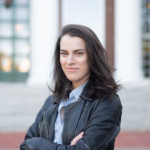

MBA students have been pulling HBS towards the future, but our ecosystem needs a boost — and the time is now.
The mission of Harvard Business School is to educate leaders who make a difference in the world. Of course, the type of difference—whether positive or negative—has continued to be left strategically vague, with a footnote that clarification would involve making subjective judgments on “goodness” of impact. As individuals who spent our early careers on decarbonization-driven technologies and environmental, social and governance (ESG) investments, we have incredibly clear focus when it comes to how critical the next 10 years are for addressing the climate crisis.
We came to HBS with some unease that the ecosystem might not align with the aggressive steps we believed global leaders must take to increase peaceful prosperity and avert climate disaster. We have discovered that while the HBS curriculum is catching up, students are leading the charge with growing interest in working on our climate future. We are writing because we are proud to see HBS and the world of business moving forward—in interest and in action—and we see opportunities to accelerate this shift.
At HBS, five student clubs are key hubs for students thinking about a decarbonized future: Energy & Environment Club (E&E), Social Enterprise Club (SEC), Sustainability Club, Food Agriculture & Water Club (FAW), and Impact Investing Club (IIC). 439 students, including 30% of this year’s RC class, belong to at least one of these clubs. Multiple clubs have been created in recent years as student interest has grown, with IIC spun out of SEC and Sustainability Club spun out of E&E. While the clubs could reasonably exist under the same umbrella, each niche has successfully maintained dedicated programming and membership. Some clubs, like SEC and FAW, have increasingly shifted towards addressing climate issues, based upon interest from club members. SEC’s International Development interest group pivoted towards Sustainable Development in 2020 while FAW rebranded to address climate change in 2017. 
In the last three years, there has also been a marked increase in interest in related career programming and recruiting. In 2019, 60 RCs attended the START Sustainability session at the beginning of the year. In 2020, that number doubled to 112 students. When comparing CPD data on organizations and roles that have hired HBS students between the classes of 2018-2019 and 2020-2021, we found an increase of 50% for roles related to energy, environment, social impact, ESG, or sustainability. Similarly, alumni subscribers to the Business and Environment Initiative (BEI) newsletter have increased by 38% since 2015, which aligns with HBS MBAs’ increasing interest in careers in the BEI space.
The data demonstrates increasing student interest, but how has HBS responded? Between 2018 to 2020, the BEI worked hard to increase membership from 27 to 34 affiliate faculty members, supporting the increase in annual generation of BEI-related research output (books, cases, journal articles, and such) from 38 to 43 this year, and the year is not over yet. Two new climate-related short intensive programs (SIPs) are being offered this year—“Climate Finance” and “Is the End (of Oil) Near?”—which filled up within days and vastly exceeded the 30 person limit. We are buoyed by HBS faculty’s efforts to increase the academic offering with new SIPs, more BEI affiliation, and more new courses. Additionally, we are emboldened by instances of Harvard investing in the local ecosystem of purposeful technology development, with a $25 million investment in the most recent fund of the local accelerator The Engine, announced in October.
However, more resources, courses, and career opportunities are desperately needed to train HBS students to make a positive difference. Student-led research by Lauren Buchanan and Rob Self (MBAs ’21) identified that HBS is lagging other comparable business schools in academic offerings on climate, energy, and ESG. Students need help academically accessing more information about different aspects of this broad and quickly changing space. Currently and historically, four separate ESG, sustainability, and agribusiness classes have been scheduled in one competing time slot for ECs, which fractures the demand and depresses the interest numbers for HBS course planning. This is especially pernicious for prospective career-switchers, for whom new knowledge helps de-risk career next steps.
Critically, while there has been a marked increase in students exploring these interests in their internship search, most of those expressing career interest are not actually launching full-time post-MBA jobs in the space, according to Lauren Murphy, who leads Sustainability & CPG at CPD. Additionally, while the year-over-year internship increase is significant, the overall numbers are still relatively small.
What is clear: the path to careers and life’s work in this space needs to be actively de-risked by HBS.
One key way to de-risk the path is to create programs that provide clarity and financial stability immediately post-MBA. This could look like a “loan forgiveness” sponsorship program, where a fellowship or a private company pipeline can sponsor incoming HBS students to spend at least two years after HBS in public service and technological impact jobs. This would require intentional work by HBS or a fellowship fund to establish a robust sponsorship pipeline and process. Another way to stabilize the path is to increase the incentives for programs like HBS Leadership Fellows by connecting these roles to a subsequent role in industry (for instance, an MBTA role that feeds into a role at a sustainable economy transportation company, or a public hospital role that leads to a role in a private healthcare group).
A second critical way to mitigate this problem is to create confidence and a conversation around purpose, impact, and happiness as a value for HBS graduates, in large part, by changing the way we discuss “making a difference in the world” as a core principle during RC year. Twenty years ago, the TEM curriculum was introduced, and an alum donated funding for the Arthur Rock Center for Entrepreneurship three years later. Now, entrepreneurship is a credibility-stamped path at HBS, supported by students’ peers and by institutionalized funding opportunities. We believe that, within the next 20 years, purpose and climate impact will similarly have a core space in the HBS ecosystem. But 20 years is way too long for a world that needs to change extraordinarily quickly between now and 2050. Alumni, faculty, administration, and graduating students – it is past time to double down on creating the leverage that HBS’ future leaders are demonstrating they need to try to save the world. The clock has already run out. The time to focus on the climate crisis is urgently and increasingly now.
***
The rapidly expanding ecosystem in Boston has many events to offer in November, including at HBS. Registration is currently open for:
- The 17th Annual Energy & Environment Symposium: The New Economy (Nov 15)
- The Rise of Corporate Sustainability (Nov 16-19)
- The Food, Agriculture & Water Conference: Building a Resilient, Sustainable, and Nourishing Global Food System (Nov 18)
 Morgan Sheil (MBA ’21) has degrees in Chemical & Biomolecular Engineering and Engineering for Sustainable Development. She has worked as an engineer in oil & gas and supply chain optimization, and in ESG investing & asset stewardship. She is the SA VP of Sustainability, Co-President of the Social Enterprise Club, and Community Director for PRIDE. She likes piña coladas and getting caught in the rain.
Morgan Sheil (MBA ’21) has degrees in Chemical & Biomolecular Engineering and Engineering for Sustainable Development. She has worked as an engineer in oil & gas and supply chain optimization, and in ESG investing & asset stewardship. She is the SA VP of Sustainability, Co-President of the Social Enterprise Club, and Community Director for PRIDE. She likes piña coladas and getting caught in the rain.
Raquel Schreiber (MS/MBA ’21) is passionate about accelerating renewable tough technologies. Prior to HBS, she led technical programs in battery and solar at Tesla. She is the MS/MBA Program Women’s Chair and the E&E Club’s Symposium Co-Chair. The Symposium is taking place on November 15, 2020, and this article is absolutely not a plug for that event.


